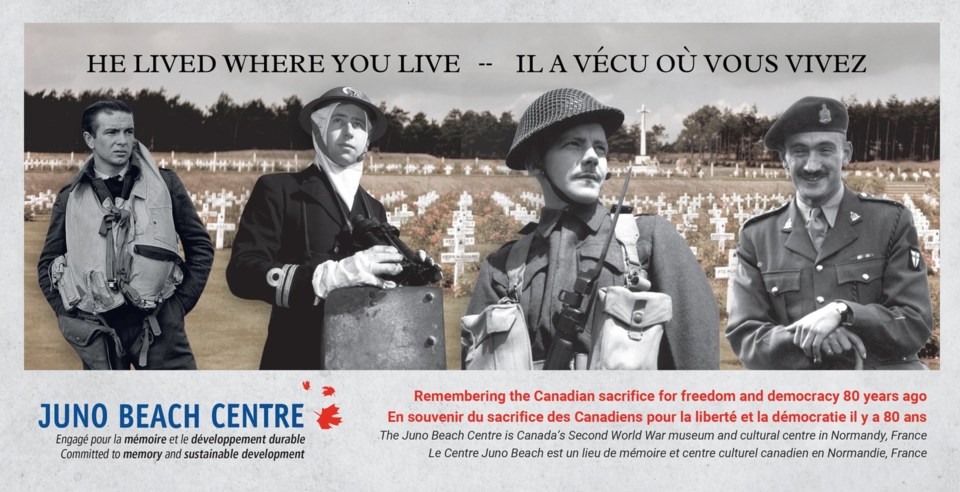HALIFAX — Over the last week, selected homes across Canada received poignant reminders of military members who fought and died in the final months of the Second World War.
Each address was mailed a postcard with the name, story and fate of an individual soldier, sailor or airman who had lived there prior to enlisting in Canada’s war effort.
As part of its “He Lived Where You Live” program, the Juno Beach Centre — Canada's war memorial museum in Normandy, France — issued postcards to 1,945 addresses to commemorate the 80th anniversary of Victory in Europe Day on May 8, 1945.
At their Toronto home, Gary Domski and his family recently received a postcard commemorating Pte. Peter Forbes Flett, a member of the Highland Light Infantry of Canada who died on Nov. 2, 1944, at the age of 20 — two days after he was wounded fighting in the Netherlands. Flett is buried at the Adegem Canadian War Cemetery in Belgium.
Domski said in an interview Thursday that he was already familiar with Flett’s story prior to receiving the postcard because of a letter that had been dropped off by one of the late soldier's relatives. It detailed the family's history at the residence, which Domski bought about 10 years ago.
He said he tries to make sure his three children are aware of Canadian history, adding that getting the postcard “connects you personally to the event and to the sacrifice.”
“It definitely brings a different perspective to someone that lost their life, and being a parent with a son it kind of hits you,” Domski said. “This (card) is a great reminder … and I think it’s a great thing to unify the country.”
Sal Falk, a spokesperson for the Juno Beach Centre Association, said the aim is to pay tribute to Canada’s war fallen, while making sure that communities can connect with the personal stories and the overall history of the war.
“It’s a pivotal moment in Canada as we all know with a heightened sense of pride and trying to figure out our identity,” said Falk. “I think this is a piece of Canadian history that everyone can rally behind, understanding that people who served from across the country … came from every walk of life, every neighbourhood and every community.”
Over the last two years the centre conducted research using digitized files from Library and Archives Canada as well as the archives of the Commonwealth War Graves Commission to gather information about service personnel as well as their last known addresses in Canada.
The data was cross-referenced with Canada Post records to confirm that the addresses for the 1,945 service personnel chosen to be honoured — who died between July 1944 and May 1945 — still exist.
“We know the number seems somewhat arbitrary, but we figured that with the symbolic (year) number of 1945, choosing 1,945 postcards to send felt like the right thing,” said Falk.
Another postcard was sent to an address in New Glasgow, N.S., where Cpl. Gerald Austin Ellis lived. A native of Digby, N.S., Ellis was a machinist at the nearby Trenton Industries steel plant prior to enlisting in the army in February 1944.
Ellis landed in Europe in September 1944 and fought in the Netherlands where he was killed in action on Feb. 27, 1945. He is buried in the Groesbeek Canadian War Cemetery and is one of more than 45,000 Canadians who died in the war — with about 14,000 killed in Europe during the conflict’s final months.
After the carnage of the Allied breakout from Normandy in August 1944, the Canadian Army took part in the pursuit of German forces through France and into Belgium before liberating the Netherlands and striking into Germany.
Falk said the centre’s latest postcard campaign is its third; the idea was initially conceived to mark the 75th anniversary of D-Day in 2019, with about 200 postcards being mailed. A similar campaign was used in 2022 to commemorate the 80th anniversary of the Dieppe Raid.
“We found that the response was overwhelming,” said Falk, who added that the campaign helps the D-Day museum at Juno Beach in France reach Canadians at home.
“There is a pilgrimage spot for Canadians to go over and learn more, but we know that not everyone can make that trip,” said Falk. “So this helps make sure that history gets into the homes of Canadians.”
This report by The Canadian Press was first published April 25, 2025.
Keith Doucette, The Canadian Press



